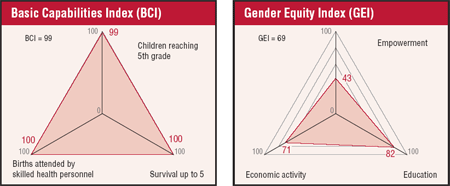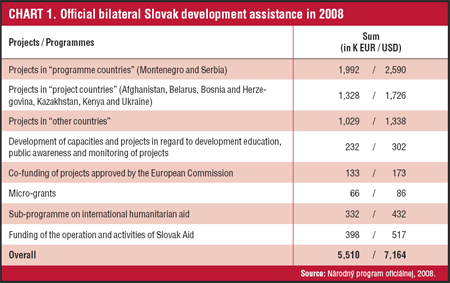Revising the plans
Revising the plans
Slovak Political Institute
Faculty of Economics, Technical University of Košice
Daniel Klimovský
Slovakia successfully reformed its economy to enter the EU. Growth is slowing down, however, and the car industry – the country’s industrial pride and joy – is already reducing production. To tackle the crisis the Government has taken various measures, many designed to boost employment and regulate the market. For their part, NGOs must immediately address their lack of preparedness for the crisis. Discrimination against Roma and women persists, as does the authoritarian way in which the Government tries to ignore its political opponents. Overseas development assistance (ODA) has been legally institutionalized and is growing; nevertheless it still remains below EU standards.
 |
Slovakia implemented several painful social and economic reforms before and after acquiring full EU membership in 2004. Thanks to these, the country achieved economic growth above 7% in 2008, the highest in the EU. Moreover, Slovakia met the requirements of the European Economic and Monetary Union and replaced the Slovak Crown with the Euro on 1 January 2009. The European Commission stated in November 2008 that Slovakia (together with the Czech Republic and Poland) did not present any dramatic scenarios in terms of the global crisis and actually projected economic growth of 2.7% in 2009 and 3.1% in 2010, with the economy expected to remain among the top performers in the EU for 2009 and very likely for 2010.
However, a gradual sobering began in 2009.1 The National Bank of Slovakia predicted in April that the economy would decline by 2.4% during the year, then grow by 2% in 2010 and 3.2% in 2011. A more pessimistic prediction was made by the European Bank for Reconstruction and Development in early May, estimating that the Slovak economy would decline by 3.5% in 2009, and then grow by 0.8% in 2010. Meanwhile, Government data show that unemployment rose sharply in December 2008 to almost 8.4% (from 7.8% in November). After estimating in January 2009 that more than 15,000 jobs would be threatened, the Ministry of the Economy re-evaluated this in April and forecast job losses topping 30,000.
Slovakia is considered “the Detroit of Europe” with the Kia, Peugeot and Volkswagen plants, together with their network of suppliers, comprising a more than 20 billion EUR a year industry that provides more than 75,000 jobs. However, the firms depend on European demand, since the Slovak car market is too small and conservative, and in early 2009 they reduced production.
Coping measures
In January 2009 the Government launched a EUR 332 million (USD 431 million) plan to support employment and boost domestic demand to fight the crisis. A Crisis Committee, made up of representatives of government, the Central Bank, commercial banks, trade unions, employers, municipalities and the parliamentary opposition2 was set up to analyse the impacts of the crisis and propose measures to address them. The following month, the Ministry of the Economy announced some 62 measures to eliminate or at least alleviate some impacts, including the utilization of EU funds, the preparation of public-private partnership projects for the construction of highways, and increasing state expenditure for diverse research and development projects.
The Government has also begun to be more proactive in regulating prices, approving selective support tools for tourism and issuing requirements and/or recommendations for banks and enterprises. In addition, in March 2009 it re-purchased for USD 240 million the 49% block of Transpetrol’s shares sold to Yukos International for USD 74 million in 2002. This potentially gives it a strong hand in determining the country’s energy policy.
So far, Slovak NGOs have not focused on the global economic crisis. They need to do so for several reasons: donors will be cutting contributions for philanthropic activities; a lack of resources will mean NGOs have to re-evaluate their priorities and activities; the crisis will create more demand for NGO assistance or co-operation; and there will be more intrusive and frequent political or state interventions in relation to NGOs and their activities. For instance, the Government might require NGOs to support those activities it considers most relevant; as only a few NGOs are really politically independent, it would be in a unique position to fund supporters and punish opponents through the distribution of state subsidies and grants.
The “tyranny of the majority” continues
Despite accomplishments at the European level, the internal political scene remains highly strained. The ruling coalition – the two main parties in which are the Smer and the Slovak National Party (SNS) – continued its “tyranny of the majority” during 2008 and the beginning of 2009. Complete disregard for the political opposition was a daily occurrence (e.g., the representatives of Smer as well as the Government – including the Prime Minister – repeatedly emphasized that the opposition should not expect to discuss government proposals or have an opportunity to participate in any decision-making process).
The Government also found a new enemy: the media. The Prime Minister has called journalists idiots, prostitutes and silly hyenas and has criticized them as former agents of the National Security of the Czechoslovak Socialist Republic (who are also among his own supporters). The so-called “Hungarian card” was played in the campaign for the March 2009 presidential election, with the winner and current President and his main supporters (the Smer and the SNS) issuing a statement accusing their principal opponent of being supported by members of the Hungarian minority. This divided Slovak society and offended Hungarian nationals.
Populism and nationalist politics surfaced immediately after the ruling coalition took office in 2006.3 Early in 2008 the Prime Minister began to mythologize Slovakia’s history, coining the term “old Slovaks”4 while defending the historical figure of highwayman Juraj Jánošík, dubbing him “the first socialist”.5
Another severe problem is corruption and clientelism. The ruling coalition repeatedly advocates its right to favour its own party members or other supporters. However, several ministers as well as senior civil servants had to step down or were withdrawn due to pressure from international institutions (e.g., the European Commission), the national media and the political opposition.6
Discrimination
The Geneva-based Centre on Housing Rights and Evictions gave a 2007 Housing Rights Violator Award to Slovakia (along with Burma and China), criticizing its persistent discrimination against its Roma population, who frequently are segregated and/or forcibly evicted from their homes. More than 120,000 Roma reside in slums, lacking access to basic services such as water and electricity. The Government has done little to improve this situation, and Roma living conditions are still far below the European average. An especially egregious case of abuse occurred in March 2009 when policemen forced six young Roma boys to undress and to hit and kiss each other. The incident was videotaped and the officers and their direct superiors were fired. The director of Charter 77, Zuzana Szatmáry, protested, however, noting that sanctions must match the severity of the offence –which these clearly did not.
The Committee on the Elimination of Discrimination against Women, during its 41st session in New York in 2008, pointed to a number of concerns as described in the last country reports for Slovakia, and advised the Government to take measures to address these.
Development assistance
The years 2004-07 were considered a transitional period, during which the Slovak Agency for International Development Co-operation (Slovak Aid) approved 229 projects for almost EUR 14 million (USD 18 million). The institutionalization of Slovak Aid was legally completed on 1 February 2008, when the Act on Official Development Assistance came into force.
In April 2008, the “National Programme for Official Development Assistance in 2008” was approved. Financial resources were primarily destined for Afghanistan, Belarus, Bosnia and Herzegovina, Montenegro, Kazakhstan, Kenya, Serbia and Ukraine. There was also a lump sum for several other countries (Albania, Kyrgyzstan, Macedonia, Mongolia, Mozambique, Sudan, Tajikistan and Uzbekistan). However, although official Slovak development assistance in 2008 was higher than in 2007, it is still below EU standards.7
 |
1 Pokorný, J. Global crisis – a traumatizing factor or an opportunity for Slovakia?. Available from.
2 The parliamentary opposition could nominate only one expert without any political affiliation.
3 Sáposová, Z and Šutaj, Š.. “Národnostné menšiny” [National Minorities]. In M Bútora, M Kollár and G Mesežnikov (eds), Slovensko 2008. Súhrnná správa o stave spoločnosti. [Slovakia 2008. A Global Report on the State of Society]. Bratislava: Inštitút pre verejné otázky, pp. 175-210. Mesežnikov, G.. “Vnútropolitický vývoj a systém politických strán” [Domestic Political Development and Party System]. In M Bútora, M Kollár and G Mesežnikov (eds), Slovensko 2008. Súhrnná správa o stave spoločnosti [Slovakia 2008. A Global Report on the State of Society]. Bratislava: Inštitút pre verejné otázky, pp. 17-125.
4 Although there is some controversy regarding the location of Great Moravia (the Slavic state that existed at the turn of 9th and 10th centuries), mainstream historiography locates it on both sides of the river Morava, in the present territories of Slovakia and the Czech Republic, meaning its inhabitants should be considered the ancestors of modern Moravians and Slovaks. The term “old-Slovaks”, however, seems more akin to such terms as “old-Hungarians” or “old-Magyars”.
5 Mesežnikov, G. “National populism in Slovakia: actors, issues, strategies”. In O Gyárfášová and G Mesežnikov, National populism in Slovakia. Bratislava: Institute for Public Affairs, 2008. pp. 7-34.
6 In one case, the Minister of the Economy, in a March 2007 interview officially advocated the use of bribery to win arms contracts if the State hoped to compete with private weapons dealers. See Sičáková-Beblavá, E.. “Slovakia”. In D Zinnbauer and R Dobson (eds), Global Corruption Report 2008. New York: Cambridge University Press, p. 268.
7 Klimovský, D. “Slovakia: More development aid, though discrimination remains.” Social Watch Report 2008: Rights is the answer, pp. 182-183.


